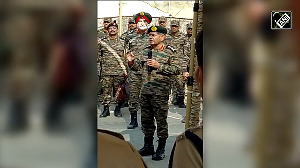Tellis is a Mumbai-born, US strategic expert, who was intimately involved in the negotiations of the US-India civilian nuclear agreement and was on the American team that negotiated the 123 Agreement that was finally hammered out in July.
In an interview with India Abroad, Tellis, a senior associate with the Carnegie Endowment for International Peace, but a consultant adviser to Under Secretary of State Nicholas Burns -- the chief US interlocutor of the deal --who was always at Burns' side during the negotiations, said, "The negotiations ended precisely at 2 pm on Friday afternoon (July 20), but what was cleared up at that point were mainly derivative issues."
He said, "All important issues were resolved by Thursday and Secretary Rice encouraged both sides to complete the agreement expeditiously."
"As you know," Tellis said, "She met the Indian delegation on Wednesday morning to encourage speedy completion, but the substance of the US proposals were cleared ahead of time before the Indian delegation arrived in Washington and were shepherded by Under Secretary Burns throughout the negotiations."
Tellis acknowledged that Vice President Dick Cheney, who met with National Security Adviser M K Narayanan and the Indian delegation, "...also urged the Indian side to conclude the agreement speedily, but he did not immerse himself in any of the civil nuclear issues."
He said that what was clear was the deep sense of commitment by the Indian negotiators to get the 123 Agreement -- that had been stalled for so long because of the reprocessing issue -- done, and for it to be done right and were absolutely resolved not to return home empty-handed.
Tellis said that there was this "...need to complete the agreement in time to proceed with the other discussions -- with the IAEA and the NSG -- was paramount," and he acknowledged that "National Security Adviser Narayanan's and Dr (Anil) Kakodkar's presence implied that decisions could be made and ratified on the spot."
But he said, "Full credit, however, must be given to Foreign Secretary (Shiv Shankar) Menon and to Dr (S) Jaishankar, both of whom carried the burdens of the actual negotiations for four full days -- they represented their country with great professionalism, tact, and good humor, which made a difficult and involved negotiation much easier."
Tellis also, as had senior Bush administration in earlier interviews with India Abroad, described as "completely wrong," reports in the Indian media that India had got the better of the US and got everything it demanded while not making any compromises at all, and argued as Burns had told reporters at a comprehensive briefing at the State Department on July 27 that India's proposal of a fully safeguarded dedicated facility for the US and foreign nuclear fuel supplies was what was the turning point.
All of these reports that India got the better of the US are "...completely wrong," he said. "The final agreement represents a clear victory for both sides because we were able to reach solutions that fulfilled both the President and the Prime Minister's Joint Statement of July 18, 2005 and March 2,2006, as well as all relevant US laws simultaneously."
Tellis predicted, "When the text finally becomes public, you will see that all claims that India got what it wanted 'at the expense of the United States' are erroneous."
He asserted that the US had not compromised in any way with regard to testing by India in so far as making arrangements for continued fuel supplies from other sources even if US laws were violated by India, which would result in Washington being prohibited from continuing it's own fuel supplies to India.
"All the solutions that have been codified in the agreement are consistent with US law," Tellis emphasised. The fuel assurances were offered on March 2, 2006, and their application will not violate US law."
Tellis reiterated that Kakodkar's presence as part of the delegation, even though he did not participate in the negotiations, was indispensable, and in a sense, how imperative his imprimatur was to the negotiations was always permeating the discussions, albeit subliminally.
"His presence helped shorten the decision time, because proposals could be cycled rapidly," he said. "I also think that, contrary to the public perception, Dr Kakodkar was committed to this agreement. He just wanted to ensure that the Department of Atomic Energy equities were protected and that any agreement not undermine India's strategic program and the three-stage plan."
Meanwhile, Burns notwithstanding his comprehensive briefing on July 27, which coincided with the briefing in New Delhi by Narayanan and Menon, continued to be pressed on the 'hypothetical' on what the scenario would be if India did in fact test, despite all of its commitments of a moratorium on testing et al.
Burns told a few reporters, including India Abroad, that "the fuel assurances were offered by the President to the Prime Minister on March 2, 2006, and we stand by the assurances."
He explained that the "most important legal aspect of this would be the legal obligations we are served by the Atomic Energy Act of 1954 as well as the 1978 Nuclear Nonproliferation Act."
Burns said, "What is paramount to any agreement is a country's obligations to its own laws, and so we have preserved -- as we must -- our obligations under US laws in this agreement."
But he argued, "That is not inconsistent with the fact that we presume that this agreement is going to go forward on an unfettered basis -- that we are not going to face these hypothetical problems and that therefore the fuel assurances are meant to do one thing -- to help prevent in the future what happened to India in the past."
"And, we hope and trust that will be the case," he added. "But if any of these hypothetical situations do arise, we obviously will undertake the obligations that we have to undertake."
However, when pressed as to whether the US will actively undertake to make sure that India continues to be provided with the fuel under safeguards even if it tests and contravenes US laws, Burns spoke of how the US has mentioned that France and Russia as countries that can help "to construct an international fuel facility so that it has a pool of fuel available."
Burns noted nonetheless, "There are lots of different contingencies that would interrupt the fuel, not just the worst case contingency of a nuclear test. There are lots of others and these are technical, these are regional, and they could be political, and so the Indians quite properly need to safeguard their options and we specifically said we'd go out and help them establish that facility."
For example, he pointed out, "We recommended that they go to El-Baradei (IAEA chief Mohammed) and say, 'Look, how can we assure, how we India continue this fuel supply? -- and that was a year and a half-ago. So, nothing has changed between now and then."
The reporters however continued to press him asking how could acquiescing, cooperating, in any way in ensuring that India continues to receive fuel supplies if it tests and why that doesn't violate what the Hyde Act says, Burns maintained, "It doesn't because what we made sure in this agreement is that we would honor the Hyde Act and the Atomic Energy Act in our legal obligations and they are fully protected."
"But, again," he reiterated, "These are extreme hypothetical situations and I think it is very important that you go into an agreement to protect yourself against them, but the main thing you try to do in an agreement is to organise a way to cooperate in a positive basis and that's where the fuel assurances kick in."





